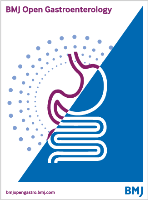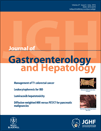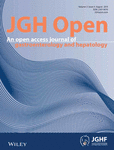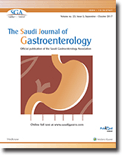
BMJ Open Gastroenterology
Scope & Guideline
Connecting Researchers for a Healthier Gastrointestinal Future
Introduction
Aims and Scopes
- Inflammatory Bowel Disease (IBD) Research:
Significant focus on the epidemiology, treatment, and management of IBD, including Crohn's disease and ulcerative colitis. This area includes studies on patient experiences, treatment outcomes, and the impact of therapies on quality of life. - Gastrointestinal Oncology:
Research related to the diagnosis, treatment, and outcomes of gastrointestinal cancers, particularly colorectal cancer. This includes studies on risk factors, screening practices, and innovative treatment approaches. - Liver Disease and Hepatology:
Exploration of various liver conditions including non-alcoholic fatty liver disease (NAFLD), hepatitis, and liver cancer. The journal emphasizes the relationship between liver health and systemic conditions, alongside management strategies. - Gastrointestinal Microbiome:
Investigations into the gut microbiota's role in health and disease, including its impact on inflammation and metabolic disorders. This area includes studies on microbiome profiling and therapeutic implications. - Endoscopic Techniques and Innovations:
Focus on advancements in endoscopic procedures and technologies, including their application in diagnosis and treatment of gastrointestinal diseases. Research includes evaluation of new tools and techniques for enhancing patient care. - Patient-Centered Research:
Emphasis on understanding patient experiences, preferences, and outcomes in the management of gastrointestinal diseases. This includes qualitative studies and surveys that inform healthcare practices.
Trending and Emerging
- Artificial Intelligence in Gastroenterology:
There is a growing trend towards incorporating artificial intelligence in diagnostic and therapeutic processes within gastroenterology. This includes studies on AI-assisted endoscopy and predictive algorithms for patient outcomes. - Health Disparities and Social Determinants of Health:
Research addressing the impact of social factors on gastrointestinal health outcomes is on the rise. Studies are increasingly focusing on health disparities in various populations and how these affect disease prevalence and management. - Digital Health and Telemedicine:
With the rise of digital health tools, there is a marked increase in studies exploring the effectiveness of remote monitoring, telehealth consultations, and mobile health applications in managing gastrointestinal diseases. - Microbiome-Related Therapies:
Emerging interest in the therapeutic potential of microbiome modulation, including fecal microbiota transplantation and probiotics, is becoming a significant area of research as understanding of gut microbiota expands. - Longitudinal and Cohort Studies:
There is a trend towards conducting long-term cohort studies that track patient outcomes over time, particularly in chronic conditions like IBD, to better understand disease progression and treatment efficacy.
Declining or Waning
- Traditional Pharmacological Treatments:
There appears to be a decline in studies focused solely on traditional pharmacological approaches to managing gastrointestinal diseases, as newer, more integrative treatment modalities and personalized medicine approaches gain traction. - Basic Science Research:
Research that focuses on the fundamental biological mechanisms underlying gastrointestinal diseases has become less frequent, as there is a notable shift towards applied clinical research and patient outcomes. - Surgical Techniques:
While still important, the frequency of publications centered on traditional surgical techniques in gastroenterology seems to be declining in favor of less invasive approaches and endoscopic innovations.
Similar Journals

Gastroenterology Insights
Unlocking New Perspectives in GastroenterologyGastroenterology Insights is a premier open-access journal published by MDPI since 2009, focusing on essential research and developments within the fields of gastroenterology and hepatology. With a dedicated ISSN of 2036-7414 and E-ISSN 2036-7422, this journal serves as a vital platform for disseminating innovative studies and insights pertinent to gastrointestinal health, disorders, and treatment modalities. Based in Switzerland, Gastroenterology Insights boasts a significant academic presence, currently positioned in the Q3 quartile for both gastroenterology and hepatology categories as of 2023, reflecting its impactful contributions to the disciplines. With Scopus rankings placing it at the 94th and 48th positions in gastroenterology and hepatology respectively, the journal is committed to advancing knowledge and fostering collaboration among researchers, professionals, and students alike. By providing an open-access model, it ensures that high-quality research is accessible globally, thereby enhancing the reach and impact of crucial findings in the science of digestive health. Researchers looking to publish cutting-edge work will find Gastroenterology Insights a valuable resource for both sharing and acquiring knowledge.

JOURNAL OF GASTROENTEROLOGY AND HEPATOLOGY
Pioneering research for a healthier digestive future.Welcome to the JOURNAL OF GASTROENTEROLOGY AND HEPATOLOGY, an esteemed publication in the field of gastroenterology and hepatology, proudly published by WILEY. Established in 1986, this journal serves as a crucial platform for researchers, healthcare professionals, and students, presenting groundbreaking research and comprehensive reviews that drive advances in understanding and treating gastrointestinal and liver diseases. With a strong reputation evidenced by its Q1 ranking in gastroenterology and Q2 ranking in hepatology, this journal ranks impressively in the Scopus metrics - positioned at #22 out of 167 in gastroenterology and #21 out of 82 in hepatology, reflecting its contribution to scholarly excellence. Although it does not offer open access options, the journal’s rich archive and diverse topics make it indispensable for those dedicated to improving patient outcomes in these critical areas of medicine. Whether you are a seasoned researcher or an aspiring medical professional, engaging with this journal will keep you at the forefront of the latest developments and emerging trends in gastroenterology and hepatology research.

JGH Open
Bridging Knowledge Gaps in Digestive HealthJGH Open is a prominent open-access journal dedicated to advancing knowledge in the fields of Gastroenterology and Hepatology, published by WILEY. Since its inception in 2017, the journal has served as a crucial platform for researchers, professionals, and students to disseminate innovative research findings and clinical insights. With an impact factor and Scopus rankings reflecting its steady growth—ranking in the 3rd quartile for both Gastroenterology (Q3) and Hepatology (Q3)—JGH Open is positioned within the competitive landscape of medicine. Its commitment to open access enhances the visibility and accessibility of high-quality research, ensuring that significant advancements in understanding diseases of the gastrointestinal tract and liver reach a broad audience. With a focus on collaboration and dissemination of knowledge, JGH Open aims to contribute to the global discourse and improve outcomes in gastrointestinal health.

Therapeutic Advances in Gastroenterology
Advancing knowledge for better digestive health.Therapeutic Advances in Gastroenterology, published by SAGE Publications Ltd, is a premier open access journal dedicated to the advancement of knowledge in the field of gastroenterology. Since its inception in 2008 and its transition to open access in 2018, the journal has consistently provided high-quality peer-reviewed research articles, review papers, and clinical studies that address the latest therapeutic advancements and challenges in gastrointestinal medicine. With an impressive impact factor and a 2023 Scopus ranking placing it in the Q1 quartile of gastroenterology journals, it stands as a leading platform for researchers, clinicians, and healthcare professionals. The journal’s commitment to disseminating impactful research has positioned it at the forefront of academic discourse, offering a vital resource for those devoted to improving patient outcomes in digestive health. The United Kingdom-based journal invites submissions that contribute to the understanding and treatment of gastrointestinal disorders, ensuring that cutting-edge findings reach a global audience.

Saudi Journal of Gastroenterology
Unlocking insights into gastrointestinal health.The Saudi Journal of Gastroenterology is a premier platform dedicated to advancing research and clinical practice in the field of gastroenterology. Published by Wolters Kluwer Medknow Publications, this open-access journal has been serving the academic community since 1995 from its base in India. With an ISSN of 1319-3767 and an E-ISSN of 1998-4049, the journal allows unrestricted access to a wealth of knowledge, fostering an environment where researchers, professionals, and students can engage with cutting-edge studies. As of 2023, it is categorized in the Q3 quartile within gastroenterology, ranking #74 out of 167 in Scopus, which places it within the 55th percentile of its field. The journal aims to disseminate significant findings, clinical trials, and innovative theories that shape the understanding of gastrointestinal disorders and practices. With a commitment to quality and relevance, the Saudi Journal of Gastroenterology is pivotal for anyone seeking to enhance their knowledge and expertise in this vital area of medicine.

Korean Journal of Gastroenterology
Connecting Disciplines for Gastroenterological ExcellenceKorean Journal of Gastroenterology (ISSN: 1598-9992, E-ISSN: 2233-6869), published by the Korean Society of Gastroenterology, has been a premier outlet for research and advancements in the field of gastroenterology since its inception in 1968. This open-access journal, based in South Korea, fosters a global dialogue on gastrointestinal health, embracing contributions from a diverse array of disciplines within medicine. It is currently ranked in the Q4 quartile for miscellaneous medicine and holds a Scopus rank of #323 out of 636 in general medicine, reflecting its commitment to publishing impactful research despite its relatively recent establishment in high-impact metrics. With a continuous publication timeline extending through to 2024, the journal aims to enhance understanding of gastrointestinal disorders and promote innovative treatments, making it an essential resource for researchers, clinicians, and students alike who seek to stay abreast of the latest developments and clinical applications in gastroenterology.

Frontline Gastroenterology
Championing Excellence in Gastroenterological ResearchFrontline Gastroenterology is a leading academic journal published by the BMJ Publishing Group that plays a vital role in advancing the field of gastroenterology and hepatology. Established in 2013, this prestigious journal has established itself as a significant resource for researchers, healthcare professionals, and students alike, maintaining a commendable impact factor and consistently achieving a Q2 ranking in both gastroenterology and hepatology categories as of 2023. With its focus on disseminating high-quality, peer-reviewed research, Frontline Gastroenterology covers a wide scope of topics pertinent to the understanding, diagnosis, and treatment of gastrointestinal and liver diseases. Although it does not offer Open Access options, its content is accessible through various institutional and personal subscriptions, ensuring that critical findings reach an international audience. As the journal continues to converge into the future, it remains dedicated to fostering innovation and dialogue in gastroenterological sciences.

Translational Gastroenterology and Hepatology
Advancing Patient Outcomes through Translational Research.Translational Gastroenterology and Hepatology, published by AME Publishing Company, stands as a pivotal platform for advancing the understanding and treatment of gastrointestinal and liver diseases. With its focus on translational research, this journal aims to bridge the gap between laboratory discoveries and clinical applications, thus fostering improvements in patient care. Although specific metrics like H-Index and Scopus ranks are currently unavailable, the journal is committed to maintaining high standards of scholarly communication and excellence. As an open-access publication, it ensures that valuable findings are readily accessible to a global audience, promoting collaboration and innovation among researchers, clinicians, and healthcare professionals invested in gastroenterology and hepatology. The journal's dedication to disseminating groundbreaking research makes it an essential resource for those seeking to stay at the forefront of these ever-evolving fields.

United European Gastroenterology Journal
Transforming insights into impactful healthcare solutions.The United European Gastroenterology Journal, published by John Wiley & Sons Ltd, is a leading publication in the fields of gastroenterology and oncology, boasting a distinguished Q1 ranking in both categories for 2023. With an ISSN of 2050-6406 and an E-ISSN of 2050-6414, this journal serves as a vital platform for disseminating cutting-edge research and innovative practices from 2013 to 2024, supporting the advancement of knowledge in gastrointestinal health and cancer treatment. With a commendable Scopus Rank of 14th out of 167 in gastroenterology and 54th out of 404 in oncology, it emphasizes the significance of impactful research in these critical areas. While currently not an open-access journal, it remains a vital resource for researchers, professionals, and students seeking comprehensive insights and evidence-based approaches to improve patient care and clinical outcomes. The United European Gastroenterology Journal is committed to bridging the gap between research and practice, making it an essential reference for those dedicated to the fields of gastroenterology and oncology.

PRACTICAL GASTROENTEROLOGY
Transforming Challenges into Solutions in GastroenterologyPRACTICAL GASTROENTEROLOGY is a distinguished journal dedicated to the field of gastroenterology, published by Shugar Publishing Inc in the United States. With an ISSN of 0277-4208, the journal serves as a pivotal resource for medical professionals, researchers, and students keen on staying abreast of the latest advancements and practical applications in gastrointestinal health. Although it does not currently operate under an Open Access model, it has been a respected publication since its inception, spanning significant years of research from 1989 to 2013 and resuming again from 2016 to 2023. Despite holding a current Q4 ranking in Gastroenterology with Scopus, its commitment to quality insights provides a platform for critical information dissemination, making it an essential read for those engaged in clinical practice and academic research. The journal’s objectives include addressing practical challenges in gastroenterology, bridging the gap between research and clinical implementation, and fostering ongoing education among practitioners in this dynamic field.